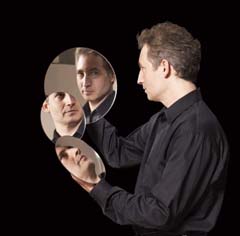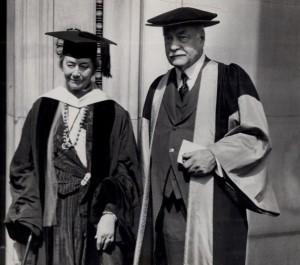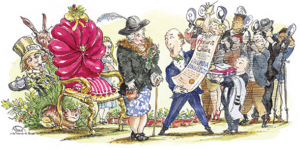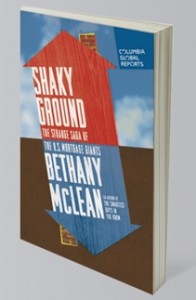From climate change in the presidential race to difficult international negotiations, presenting sitar traditions to building inclusive communities, Columbia invites the world in.
Remember, this Thursday two great faculty members, psychologist Valerie Purdie-Vaughns ’93CC and biology and chemistry professor Brent Stockwell, give the University Lecture on “Teaching and Learning in a University, Version 2.0.”
And be sure to share your event stories!
October 13
5 p.m. – 6:30 p.m.
Office of the Vice Provost for Faculty Diversity and Inclusion
Being the Change, Leading the Charge: Diversity in Higher Education
Panelists include Anne L. Taylor, vice dean of academic affairs at the College of Physicians and Surgeons; Katherine W. Phillips, Paul Calello Professor of Leadership and Ethics at Columbia Business School; Marcel Agüeros, assistant professor of astronomy; Gilda A. Barabino, dean of City College of New York’s Grove School of Engineering; and Aaron Dworkin, dean of the University of Michigan’s School of Music, Theatre, and Dance. Provost John Coatsworth will moderate. This event is complemented by a series of diversity-related activities the week of October 12. Low Library Rotunda. (Just Societies) (Reminder)
October 19
6 p.m. – 7:30 p.m.
Advanced Consortium on Cooperation, Conflict, and Complexity
The Negotiator: A Conversation with Senator George Mitchell
Former U.S. Senator George Mitchell will discuss his memoir, The Negotiator, reflect on his experiences with conflict resolution in Northern Ireland, the Middle East, and elsewhere, and comment on the nuclear agreement with Iran. Mitchell will be joined by Aldo Civico, associate research scholar director of the International Institute for Peace at Rutgers University. Register here. Teachers College, Horace Mann Hall, Room 147, Cowin Auditorium. (Global)
October 20
4 p.m. – 7 p.m.
The Institute for Religion, Culture, and Public Life
George Rupp: “The Power – and Limitations – of Individualism”
Distinguished visiting scholar and Columbia University President Emeritus George Rupp advocates for new solutions to global challenges, income inequality, climate change, and mass migration in his newest book, Beyond Individualism: The Challenge of Inclusive Communities. Rupp will speak about the challenge of inclusive communities and discuss issues raised by a panel of special guests. Reception to follow. Rupp will be on hand to sign copies of his book (which will be available for purchase). Register here. Earl Hall, 2nd floor, Auditorium. (Global, Just Societies, Climate Change)
October 26
5 p.m. – 6:15 p.m.
Center on Global Energy Policy
Lighting the World: A Conversation with Jim Rogers, Former Chairman and CEO, Duke Energy
Rogers will discuss his new book Lighting the World: Transforming our Energy Future by Bringing Electricity to Everyone and the kind of innovative thinking, international cooperation, and political will required to provide sustainable energy access to all. Moderated by David Sandalow, CGEP Inaugural Fellow. Registration is required here. Faculty House, 3rd floor, Presidential Room. (Global, Just Societies)
October 29
6 p.m. – 7 p.m.
The Earth Institute
Sustainability and Climate Change in the 2016 Presidential Race
How have environmental issues come to be as politically salient as they are today? Steve Cohen, executive director of the Earth Institute; William Eimicke, director of the Picker Center for Executive Education; and Emily Lloyd, commissioner of New York City’s Department of Environmental Protection, will look at which environmental issues will play a role in the upcoming presidential election. Moderated by Chuck Todd, from NBC’s Meet the Press. Register here. International Affairs Building, Kellogg Center, Room 1501. (Climate, 21st Century Public Square)
October 30
8 p.m. – 10 p.m.
South Asia Institute | Miller Theatre
Ustad Shahid Parvez Khan and Amit Kavthekar in Concert
Master sitarist Khan descends from six generations of sitarists. The concert will also feature Amit Kavthekar on tabla. Purchase tickets here. Miller Theatre.
November 4
7 p.m. – 9 p.m.
Columbia Law School | The Earth Institute
Who Is Responsible for Climate Change?
The question of responsibility for climate change lies at the heart of debate over actions to address it. This conference explores the scientific, legal, ethical, and policy bases for assigning climate responsibility to countries and to other entities—individuals, emitting industries, and fossil fuel companies. Speakers include Peter Frumhoff, director of Science and Policy Union of Concerned Scientists; Michael Gerrard, director of the Sabin Center for Climate Change Law; Karenna Gore, director of the Center for Earth Ethics; Sivan Kartha, senior scientist at the Stockholm Environment Institute; Naomi Oreskes, professor of the History of Science at Harvard; and Michael Vandenbergh, David Daniels Allen Distinguished Chair of Law at Vanderbilt. Register here. Jerome Greene Hall, Room 104. (Climate Change)
6:30 p.m. – 8:30 p.m.
Columbia University Libraries
Twain and Stanley Enter Paradise
Posthumous release of a work by the late Pulitzer Prize-winning author Oscar Hijuelos, with a reading by Lori Carlson-Hijuelos, lecturer in English at Duke; Frances Negron-Muntaner, associate professor of English and comparative literature; and authors Siri Hustvedt and Paul Auster ’69CC. Pulitzer Hall, World Room.
Events are now tagged where appropriate with University-wide Big Ideas: Precision Medicine, Global, Climate Change, Data and Society, Just Societies, 21st Century Public Square, and the Zuckerman Institute and the Future of Neuroscience. Through Big Ideas, faculty and students from multiple schools and campuses collaborate for transformative impact, addressing major issues of our time.
For RSVP, ticket availability, and other details, follow the links. We always appreciate hearing from you about future events!




